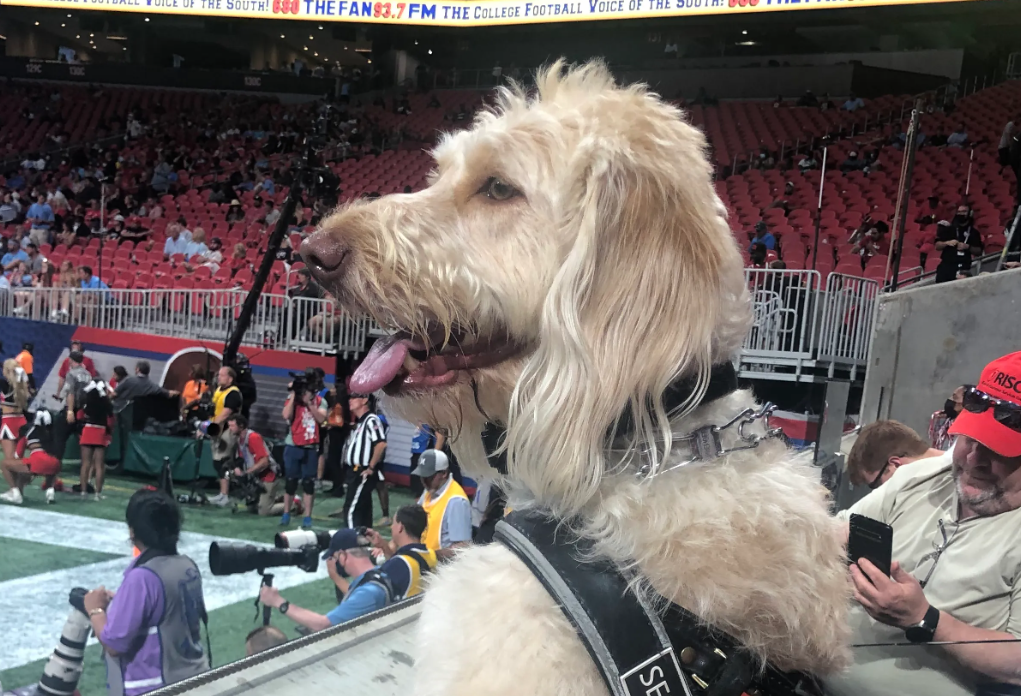Attending a lively sporting event is a favorite pastime for many, bringing delight and enthusiasm to the audience. Nonetheless, for individuals with disabilities, the task of maneuvering through bustling stadiums, enduring loud noises, and navigating complex settings can be quite daunting. This is where service dogs step in as the ultimate companions, offering crucial assistance and unwavering support to empower their handlers and allow them to relish these events with greater ease and confidence.
Access and Navigation
The paramount advantage of having a service dog by one’s side at a sporting event lies in the invaluable assistance they provide in accessing and navigating the venue. The chaotic ambiance of packed stadiums can become overwhelming, and service dogs are impeccably trained to guide their handlers to their seats, circumvent obstacles, and guide them through crowds safely. This aid is particularly significant for individuals with visual impairments, mobility constraints, or other disabilities that render moving through vast, bustling spaces challenging.
Emotional Support and Anxiety Reduction
Sporting events often entail boisterous and raucous environments, which can trigger anxiety and stress for some attendees. Service dogs serve as beacons of emotional support, exuding a serene presence that helps alleviate anxiety. For individuals grappling with conditions such as PTSD, autism, or severe anxiety, the presence of a service dog can be the deciding factor between attending the event or remaining at home.
Medical Assistance
Service dogs undergo rigorous training to perform specific tasks that could potentially be life-saving in emergency scenarios. For individuals with medical conditions like diabetes, epilepsy, or severe allergies, service dogs possess the remarkable ability to detect alterations in their handler’s condition and alert them beforehand to avert potential crises. At a sporting event, this early detection capability can prevent medical emergencies and guarantee that the handler promptly receives medical attention if necessary.
Enhanced Independence
Accompanying a service dog to a sporting event elevates the handler’s independence significantly. Instead of depending on friends, family, or event personnel for aid, individuals with disabilities can rely on their service dogs to furnish the necessary support. This instills a sense of autonomy and self-assurance, enabling them to engage more fully in the event’s proceedings.
Legal Rights and Accessibility
In accordance with the Americans with Disabilities Act (ADA), service dogs are granted access to all public spaces, including sporting events. This signifies that handlers possess the right to bring their service dogs into stadiums and arenas sans any discrimination. Organizers of events are mandated to cater to service dogs, guaranteeing that individuals with disabilities enjoy equitable access to the event’s pleasures.
Tips for Attending Sporting Events with a Service Dog
1. Plan Ahead: Familiarize yourself with the venue’s policies concerning service dogs and ensure that the staff is aware of your service dog and any specific requirements.
2. Stay Calm: Sporting events can be overwhelming, so endeavor to maintain a composed demeanor as your service dog looks up to you for cues.
3. Bring Essentials: Pack essentials for your service dog, including water, snacks, and waste disposal bags, ensuring their comfort during the event.
4. Advocate for Your Rights: In case of any challenges or resistance from event personnel, assert your rights under the ADA confidently. Be prepared to elucidate your service dog’s role and the legal protections in place.
In conclusion, service dogs are indispensable companions to individuals with disabilities, enriching their experience at sporting events and enabling them to revel in the thrill and camaraderie. By offering guidance in navigation, emotional support, medical alerts, and fostering enhanced independence, service dogs pave the way for their handlers to engage fully and securely in these events. Understanding both the legal rights and practical considerations involved ensures a harmonious and inclusive experience for all event attendees.





